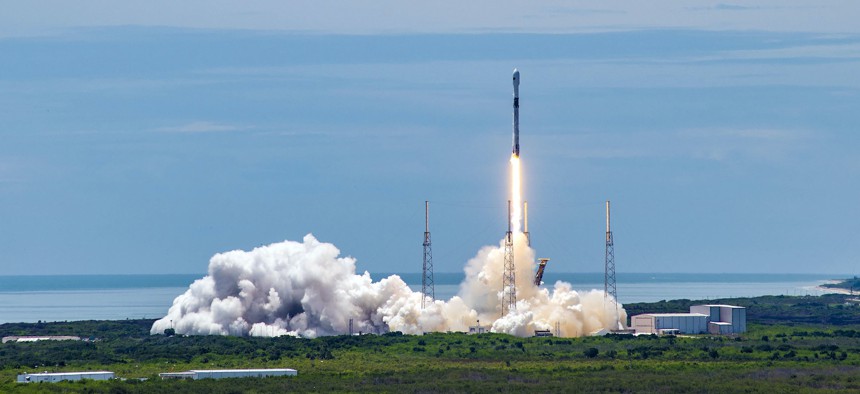
Falcon 9 launches the GPS III Space Vehicle 05 mission from Space Launch Complex 40 at Cape Canaveral Space Force Station, Florida, June 17, 2021. U.S. Space Force / Staff Sgt. Jeremy Mosier
Budget impasse freezes two Space Force efforts, leaders say
This year’s spending caps will boost future costs, acting Air Force undersecretary adds.
There’s a “real threat” that the budget impasse on Capitol Hill may delay the Pentagon’s planned low-Earth-orbit mesh network and a missile-defense program—and increase the future costs of other key programs, Space Force leaders said Tuesday.
Two key efforts are already on hold, thanks to the continuing resolutions that have barred new programs and frozen most spending at 2023 levels, SDA director Derek Tournear said at the National Security Space Association’s Defense and Intelligence Space Conference.
One would buy satellites for the orbital network, dubbed Proliferated Warfighter Space Architecture, or PWSA: specifically, 20 satellites for the Tranche 2 Gamma transport layer. SDA won’t release the solicitation until Congress passes a budget for the fiscal year that began last October, Tournear said.
The other would order eight demonstration satellites for the FOO Fighter missile-defense fire control effort. Tournear said source selection is almost done but they won’t award the contract without the 2024 budget.
“These are actual acquisition timelines that are being impacted today,” Tournear said.
If the continuing resolution extends beyond March, SDA will “have to work with our vendors because we won’t be able to continue paying them,” he said.
Companies building satellites in the architecture have “large milestone payments coming up”—which is going to be “very difficult” to deliver under a CR, he said.
“We need a budget to be able to continue to fund this. I mean, we always assume there'll be continuing resolutions for a few months, but not six to 12. That's very impactful,” Tournear said.
The Pentagon is expected to unveil its fiscal 2025 budget request on March 11, but depending on how long the continuing resolution lasts, the department might need to “revisit” some of its “strategies” because many of the 2025 investments were based on already having the money in 2024, said Kristyn Jones, who is performing the duties of Air Force undersecretary.
In addition to dealing with the continuing resolution, the Pentagon was instructed to build its budget under Congress’s defense-spending cap called the Fiscal Responsibility Act.
Because of the cap, “we were given direction across the department that we needed to focus on our near-term readiness and the capabilities that would be fielded soonest. And that required us to take some risk in some of the things that we really need to do for the future but we weren’t able to get to,” Jones said at the conference.
The Space Force doesn’t have the operations and maintenance budget that the other services have, which allows some leeway for trades, she said.
“There are significant impacts, I would say, to our long-term planning that were based on the FRA caps. And over the next couple of years, we're just going to have to continue to accelerate our investment in those efforts to keep pace with our adversaries,” Jones said.







